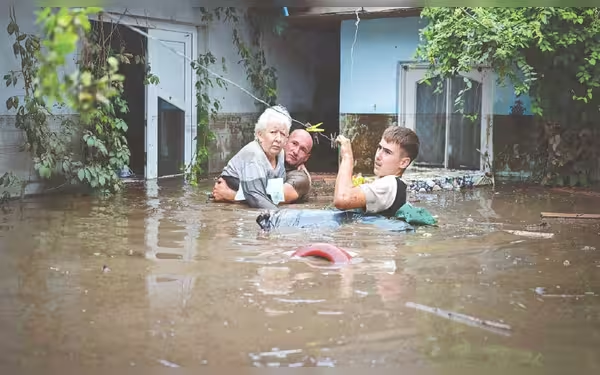Saturday, November 16, 2024 03:22 PM
Europe Faces Devastating Flooding Crisis Amid Storm Boris
- Storm Boris causes severe flooding across central and eastern Europe.
- Death toll rises to seven, with thousands evacuated from homes.
- EU and Ukraine offer support to affected countries.
 Image Credits: dawn
Image Credits: dawnEurope is grappling with severe flooding due to Storm Boris, resulting in multiple fatalities and widespread evacuations across several countries.
Parts of Europe are currently experiencing some of the worst flooding seen in decades, as Storm Boris unleashes torrential rains across central and eastern regions. Countries such as Austria, the Czech Republic, Hungary, Romania, and Slovakia have been severely affected, with rivers overflowing and causing widespread devastation. The situation has led to the suspension of road traffic and railway lines, leaving many residents stranded and in need of urgent assistance.
As the storm rages on, the human toll is becoming increasingly tragic. Reports indicate that one person has drowned in Poland, and an Austrian fireman lost his life while responding to the floods. The overall death toll from this catastrophic event has now reached seven, with thousands of individuals evacuated from their homes. In Romania, a body was discovered on Sunday, adding to the four fatalities reported earlier. Additionally, four people remain missing in the Czech Republic, highlighting the dire circumstances many are facing.
Residents in the affected areas are recounting harrowing experiences. Sofia Basalic, a 60-year-old from the village of Pechea in Romania, described the devastation, stating, "The water came into the house, it destroyed the walls, everything. It took the chickens, the rabbits, everything. It took the oven, the washing machine, the refrigerator. I have nothing left." Such accounts illustrate the profound impact of the flooding on everyday lives.
In response to the crisis, European Union Commission chief Ursula von der Leyen expressed her heartfelt solidarity with those affected, stating that the EU is prepared to offer support. Polish Prime Minister Donald Tusk confirmed the first drowning victim in the Klodzko region, which has been particularly hard-hit. Approximately 1,600 people have been evacuated in this area, and the Polish army has been called in to assist firefighters in their rescue efforts.
Austria is also grappling with the aftermath of the storm, as a fireman tragically lost his life in the Lower Austria region, which has been declared a natural disaster zone. Emergency services have been working tirelessly, with nearly 5,000 interventions reported overnight. The situation remains critical, with many residents trapped in their homes and a highway connecting western Austria to Vienna shut down.
In a show of solidarity, Ukraine has offered to send around 100 specially equipped rescuers to assist Poland, a gesture that Polish Prime Minister Tusk described as "very touching." This act of support underscores the importance of unity in times of crisis, especially as countries face the challenges posed by climate change.
As the floodwaters continue to rise, the Czech Republic is also facing significant challenges, with a dam bursting its banks and flooding towns and villages downstream. Local residents are doing their best to protect their homes, with some constructing sandbag walls to hold back the water. In Romania, the situation is equally dire, with hundreds of people rescued from flooded areas and reports of extensive damage to homes and infrastructure.
The flooding across Europe serves as a stark reminder of the increasing frequency and severity of extreme weather events linked to climate change. As communities come together to support one another, it is crucial for governments and organizations to prioritize disaster preparedness and response strategies. The resilience of the affected populations will be tested in the coming days, but with solidarity and support, there is hope for recovery and rebuilding in the aftermath of this devastating storm.













